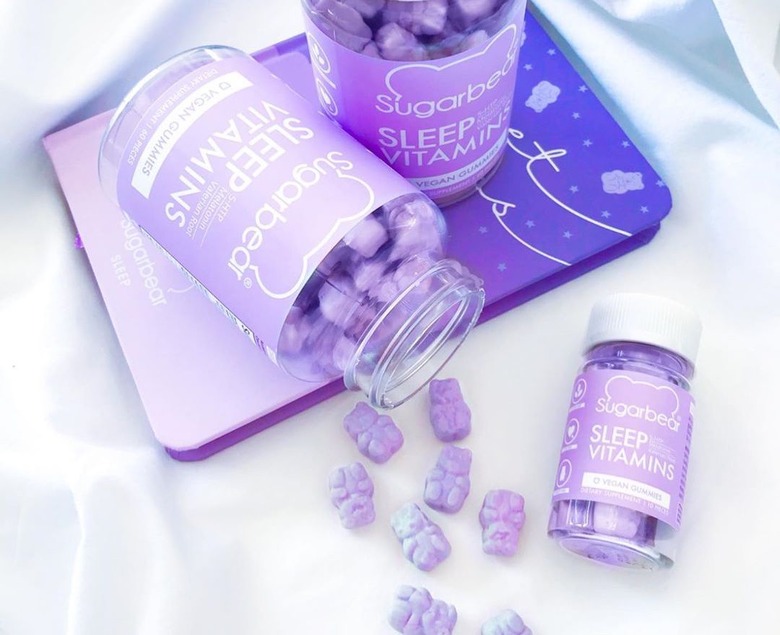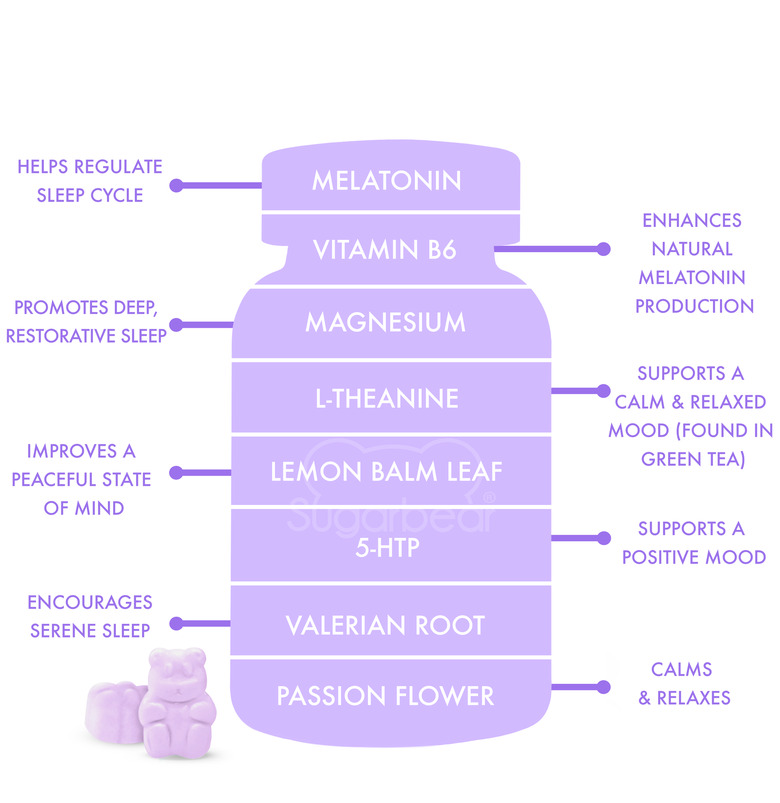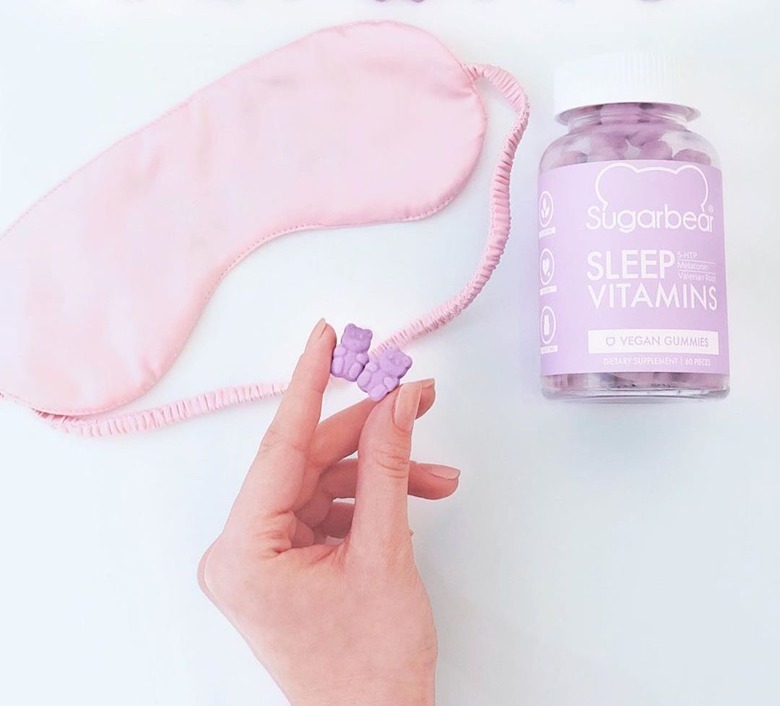I Tried Melatonin-Filled Gummies That Promise Better Sleep — Here's What Happened
The past few weeks have been — how do I put this delicately? — less than restful. Between my usual daily trials and tribulations and worrying about the current status and longterm effects of a global pandemic, it's no surprise that my quality of sleep has taken a pretty size-able hit.
So when I was invited to try out SugarBear Sleep, a vegan gummy vitamin that's aimed to help you get better sleep, I jumped at the chance. Here's what happened when I took SugarBear's sleep vitamin for two full weeks.
The Ingredients
The Ingredients
Before I dove into this gummy completely, I first wanted to learn a bit about what's actually in them. (I couldn't help but be a teeny bit curious that this came from the same brand as the infamous SugarBear hair gummy that influencers are always pushing on Instagram.)
Luckily, the brand is very open about exactly what makes up the ingredient list, which is listed on both the bottle and website and includes: Melatonin, Magnesium, L-Theanine, vitamin B6, and the brand's proprietary Rest Well Blend, which is made up of lemon balm leaf, passionflower, valerian root, and 5-HTP — all of which promote relaxation and calm in the mind and body to enhance sleep.
To learn even more, I tapped celebrity nutritionist Keri Glassman, MS, RD, CDN, and founder of Nutritious Life, who explained more about how these gummies can help. "The unique blend of sleep enhancing ingredients make it more effective than melatonin-only supplements," she says. "The melatonin helps regulate sleep cycles, the L-Theanine supports a calm, relaxed mood, and SugarBear's Rest Well Blend promotes relaxation and optimizes sleep."
Even if you are getting what you think is a good amount of sleep each, Keri explains, "quality sleep is a crucial aspect of our overall health, but most notably, our brain health." Therefore, she recommends these gummies for anyone over the age of 13 who "has trouble falling asleep and staying asleep, or those who want to focus on building healthy sleep hygiene habits."
The Good
The Good
With the ingredients checked, I was ready to test these gummies out. Per Keri's recommendation, I decided to one-up my nighttime routine and also add in a cup of chamomile tea, which can help you "get in the habit of practicing a regular wind-down night time ritual" in addition to taking these gummies.
The instructions on the bottle suggest they should be taken 30 minutes before bed, so I decided to take the recommended two after washing my face, but before brushing my teeth, and get in bed to read a little. They taste pretty good in my humble (candy-loving) opinion and although not entirely sugar-free, at three grams of sugar for each two-gummy serving, Keri says that "the effect getting quality sleep will have on your overall health will outweigh the extra grams of sugar."
As I read in bed and waited for the effects to kick in, I didn't really feel a difference in overall tiredness until — I passed out. No joke, the next thing I knew, my alarm was going off and it was morning.
I use the Sleep Cycle app to both track my sleeping and also as an alarm in the morning — it supposedly analyzes your sleep and starts the alarm at the end of a cycle so you feel most rested (jury's still out on that one) — and it gives you a percentage at the end of each sleep as a sort of grade. When I woke up after that first night's sleep, I had 100%. In fact, three out of the first four nights I used these gummies, I had a 100% sleep quality. (Pictures above.) For reference, my average sleep cycle score is 82%, so while I'm by no means a bad sleeper, a 100% score multiple days in a row is a pretty rare and exciting occurrence.
The Bad
The Bad
"Bad" is putting it a little bit strongly, but I did have a few criticisms during my two-week trial. First, I noticed that a few of the nights, I woke up in the middle of the night for unknown reasons. The screenshot below shows what I mean — around 4:30 a.m. I jolted awake and couldn't go back to sleep for about 20 to 30 minutes. Of course, this could be related to a myriad of things: a nightmare or dream that was immediately forgotten, an unknown outside noise from an animal or neighbor, or even just the immense stress the world's under weighing on me. I don't usually sleep perfectly throughout the night every single night, but these sudden jolts (and the ensuing minutes awake) happened a few times and felt different than normal. I wondered if that was somehow the gummies wearing off and my body feeling the effects fade.
On the flip side, I also felt that on some mornings, it was especially hard to wake up. I, unfortunately, don't usually wake up bright-eyed and bushy-tailed, but while taking two of these per night, I found that more often than not, I felt tired and groggy — despite my 100% sleep quality "grade."
I figured this groggy morning feeling may be due to the time of night I took the gummies and went to bed, so I decided that on nights where I get in bed a little later (around 11 p.m. or later), I'd only take only one gummy. That seemed to help my mornings, while still contributing to a good night's sleep.
Finally, it's important to note that while recommended by a nutritionist, these gummies have not been evaluated by the FDA and therefore cannot be used to diagnose, treat, cure, or prevent any disease. If you suffer from a real sleep disorder or any other medical condition, it's important to discuss with your doctor before starting any sort of treatment on your own.
The Verdict
The Verdict
Overall, I'm all for these gummies — a healthy, easy way to get a better night's sleep? Don't have to tell me twice. If you seriously suffer from sleep issues, they probably won't be a lifesaver. But, if you're like me and think your daily sleeping habits could be improved, these are a great (not to mention tasty) short-term fix — and, hey, couldn't we all use a little extra sleeping boost these days?


